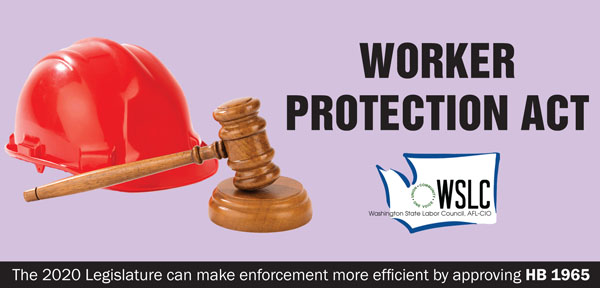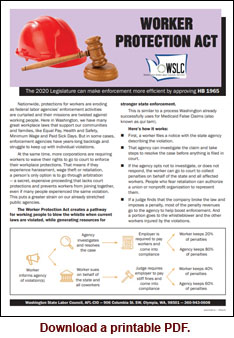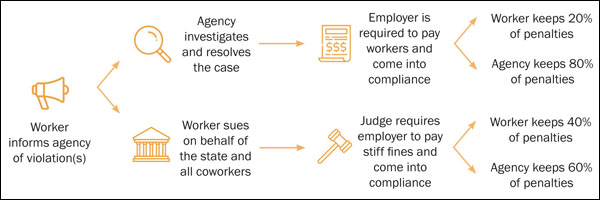STATE GOVERNMENT
Empowering workers to blow the whistle
Worker Protection Act (HB 1965) would improve compliance with labor standards, generate revenue for Washington state
OLYMPIA (Feb. 13, 2020) — Washington state is fortunate to have many great labor standards to protect working people — minimum wage, paid sick leave, health-and-safety protections, and others — that often go above and beyond federal standards. But what good are they, if limited state resources are insufficient to fully enforce them or ensure compliance?
 California answered that question back in 2004 by passing legislation that empowered workers to blow the whistle on employers that break the law. If the state doesn’t take up the case itself, the employee can file suit on behalf of the state for all affected workers. If the employer ends up paying any penalties, the state gets a share of those proceeds.
California answered that question back in 2004 by passing legislation that empowered workers to blow the whistle on employers that break the law. If the state doesn’t take up the case itself, the employee can file suit on behalf of the state for all affected workers. If the employer ends up paying any penalties, the state gets a share of those proceeds.
As reported this week in the San Francisco Chronicle, a new study by the UCLA Labor Center finds that the California law is working exactly as intended: increasing businesses’ compliance with workplace laws and generating millions for the state. California reaped $88 million last year as a result of the whistleblower law.
Now, Washington state has an opportunity to do the same by passing HB 1965, the Worker Protection Act sponsored by Rep. Drew Hansen (D-Bainbridge Island). The bill has been pulled from House Rules Committee and available for a floor vote at any time, but must pass the House by Feb. 19, the deadline for policy bills to advance from their houses of origin.

Here is a one-page fact sheet on HB 1965 from the Washington State Labor Council, AFL-CIO:
Nationwide, protections for workers are eroding as federal labor agencies’ enforcement activities are curtailed and their missions are twisted against working people. Here in Washington, we have many great workplace laws that support our communities and families, like Equal Pay, Health and Safety, Minimum Wage and Paid Sick Days. But in some cases, enforcement agencies have years-long backlogs and struggle to keep up with individual violations.
 At the same time, more corporations are requiring workers to waive their rights to go to court to enforce their workplace protections. That means if they experience harassment, wage theft or retaliation, a person’s only option is to go through arbitration — a secret, expensive proceeding that lacks court protections and prevents workers from joining together, even if many people experienced the same violation. This puts a greater strain on our already stretched public agencies.
At the same time, more corporations are requiring workers to waive their rights to go to court to enforce their workplace protections. That means if they experience harassment, wage theft or retaliation, a person’s only option is to go through arbitration — a secret, expensive proceeding that lacks court protections and prevents workers from joining together, even if many people experienced the same violation. This puts a greater strain on our already stretched public agencies.
The Worker Protection Act creates a pathway for working people to blow the whistle when current laws are violated, while generating resources for stronger state enforcement.
This is similar to a process Washington already successfully uses for Medicaid False Claims (also known as qui tam).
Here’s how it works:
● First, a worker files a notice with the state agency describing the violation.
● That agency can investigate the claim and take steps to resolve the case before anything is filed in court.
● If the agency opts not to investigate, or does not respond, the worker can go to court to collect penalties on behalf of the state and all affected workers. People who fear retaliation can authorize a union or nonprofit organization to represent them.
● If a judge finds that the company broke the law and imposes a penalty, most of the penalty revenues go to the agency to help boost enforcement. And a portion goes to the whistleblower and the other workers injured by the violations.

WHAT THE WORKER PROTECTION ACT DOES — By creating a pathway for workers to blow the whistle when laws are violated, the Worker Protection Act:
Empowers People
● Workers may enforce existing workplace and discrimination protections on behalf of the State.
● Empowers workers at all level of employment – workers do not need to perform a sophisticated analysis to know if their work place is unsafe, or their wages have been stolen.
● Enables workers to fix systematic workplace issues by bringing claims that impact all of their coworkers.
● Protects workers and whistleblowers from retaliation.
Uses Successful Process
● This type of action, also known as qui tam, is successfully used elsewhere in government to enforce the law and prevent fraud.
● Washington Medicaid Fraud False Claims Act is used by our Attorney General to root out fraud and abuse in Medicaid.
● Federal False Claims Act protects whistleblowers in Federal contracting.
Provides Cost-Effective Enforcement
● Enforcing our laws helps make our state safer and the worker protection act generates revenue to help with future enforcement of our laws.
● As part of our protection laws, our state has authorized penalties to deter corporations from breaking the law – today, low enforcement means the state rarely collects these penalties.
● Under Worker Protection, if an agency does not investigate, 60% of the penalty goes to the State to help with future enforcement; 40% to the workers. If an agency does step in and take on the case, the state receives 80% of the penalty, while 20% goes to workers.
● From 2012 to 2016, the Washington Medicaid Fraud False Claims Act recovered $6.1 million, amounting to a 3-to-1 return on enforcement investment.
● In 2017, the Federal False Claims Act was used to recover $3.7 billion, including $125 million at the Hanford site.
WHAT THE WORKER PROTECTION ACT DOESN’T DO:
● It does NOT create any new labor rights.
● It does NOT expand authority for state agencies.
● It does NOT create any new mandates for employers.





